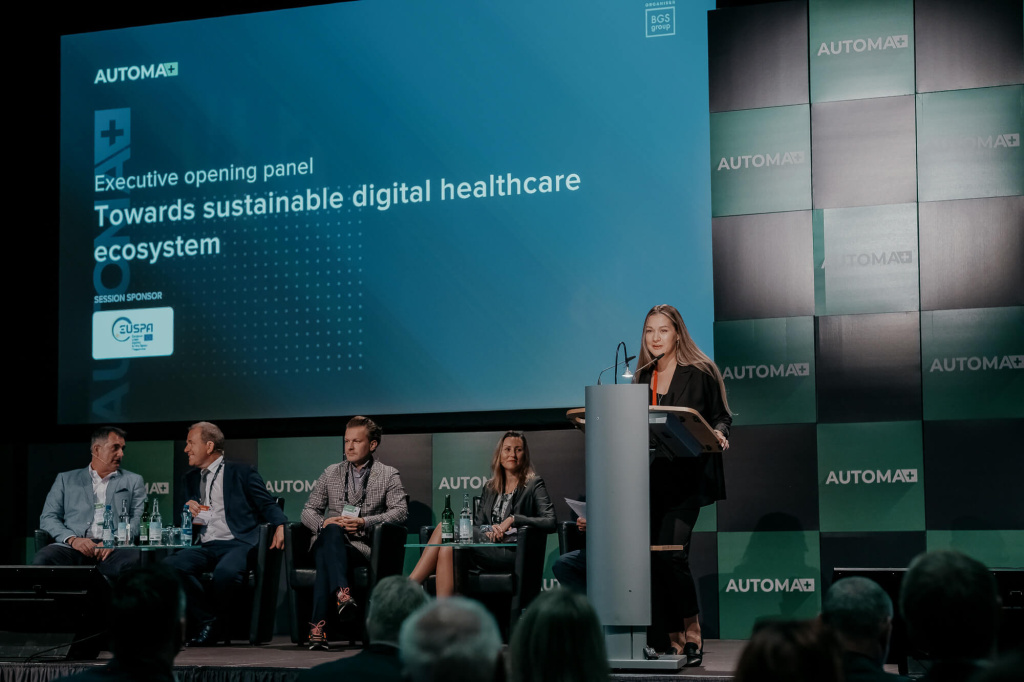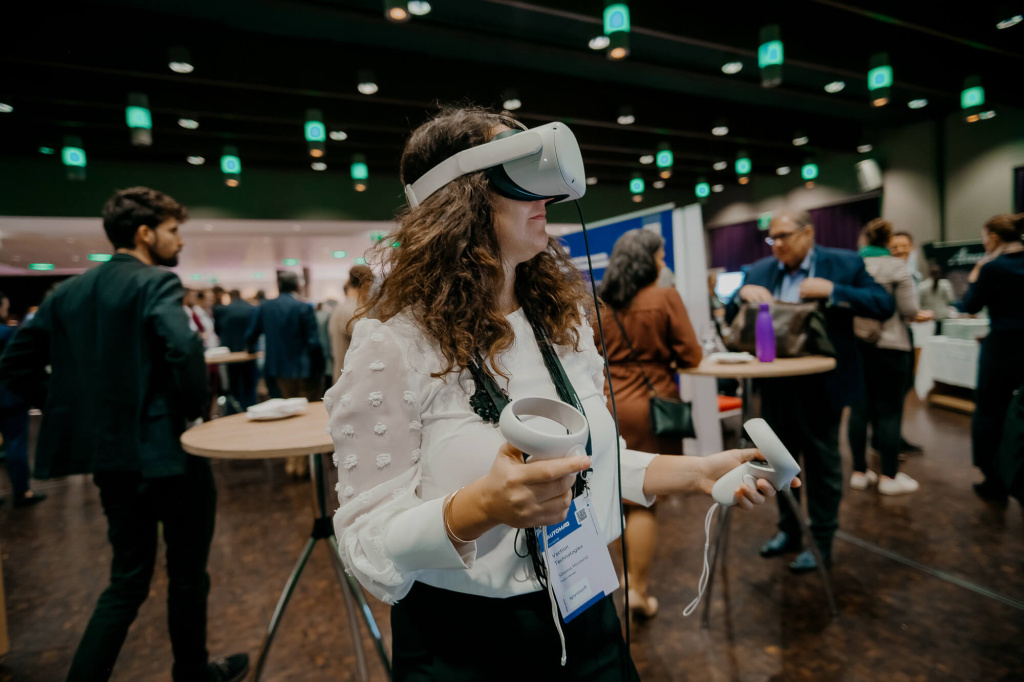Blog
AUTOMA+ 2023: Shaping the Future of Pharma with 8 Industry Innovators
 The AUTOMA+ 2023 congress in Zürich, Switzerland on September 25-26 served as a vital meeting point for pharmaceutical industry leaders, addressing critical challenges such as equitable access, data security, and patient engagement.
The AUTOMA+ 2023 congress in Zürich, Switzerland on September 25-26 served as a vital meeting point for pharmaceutical industry leaders, addressing critical challenges such as equitable access, data security, and patient engagement. Featuring speakers like Mark Milton-Edwards (TEVA), Danil Blinov (Pfizer), and Olga Drozdova (Takeda Pharmaceuticals), the event highlighted urgent issues like digital inhalers, data-driven strategies, and equity initiatives. Emphasizing clean data for AI applications and ethical practices, the congress showcased the industry's commitment to innovation and patient-centered approaches. Here are eight key highlights from AUTOMA+ 2023, showcasing substantial progress in reshaping the future of healthcare.
Digital Health Solutions and Patient-Centricity
Mark Milton-Edwards, Head of Digital Health Solutions at TEVA, set the stage of “Leaders Talk 1. The power of personalisation and patient experience” by highlighting the game-changing potential of remotely collected digital variables. TEVA's Digihaler® was presented as a revolutionary digital inhaler system, drawing parallels between aviation safety practices and modern asthma management.
Continuing Mark Milton-Edwards’ ideas, Danil Blinov, Head of Inflammation and Immunology BU at Pfizer, emphasized the urgency of patient outcomes data during “Roundtable 1. The era of data management,” stressing the need for systematic approaches and trusted data analysis providers. Both Milton-Edwards and Blinov focused on utilizing digital solutions to significantly enhance patient outcomes.
Data Quality and Data-Driven Decisions
Roundtable 1 presentations were concluded by Frank Sommerer, Program Lead for Data Quality by Design at Boehringer Ingelheim, who discussed Next Generation Data Quality Management, stressing the role of clean data for AI applications. His insights connected seamlessly with Danil Blinov's emphasis on trusted data analysis providers, underlining the crucial role of high-quality data in decision-making processes.

Cloud Computing, AI, and Supply Chain Innovation
During “Session 2. The road to Pharma digital transformation” of the congress, the focus was squarely on the critical theme of digital transformation in the pharmaceutical industry. Speakers from leading companies shared their experience, offering a comprehensive view of the ongoing changes in the sector.
The session on digital pharma transformation commenced with a profound emphasis on patient-centricity and empowerment. Christian Geis, Lead Consultant at Merkle DACH, opened the Session 2 by stressing the need to simplify treatments, promote co-therapy, and integrate user-generated insights, thus emphasizing the importance of involving patients in their healthcare decisions.
Geis highlighted a human perspective, focusing on three pillars: patient centrality, simplified treatments through telemedicine and gamification, and personalized medicine. He also addressed challenges in social media use, emphasizing the need for professional support, data privacy, and personalized content algorithms without compromising personal data.
Building upon this foundation, the conversation seamlessly transitioned to Ipek Erendor, Omnichannel & Digital Medical Manager at Sanofi, who discussed digital transformation in Medical Affairs, particularly focusing on healthcare professionals (ACPs). She reiterated the need for optimized data systems, personalized engagement, robust data collection, and AI integration.
Erendor also underscored social media's role in understanding patient needs, stressed tailored content, and highlighted the importance of technical skills and business acumen in the medical team. Global strategy consistency was noted, with local implementation variations based on market needs, reiterating sharing best practices and understanding local nuances for effective customer engagement.

Creating a customer-focused organization involves integrating new technologies like cloud computing, exemplified by platforms like Salesforce, as championed by Hilary Baseley, Head of Comex UK/IE/NX at Grünenthal GmbH. The CX approach emphasizes resilience and adaptability, aligning with patient-centric discussions from Session 2. Baseley stresses being a trusted advisor, providing comprehensive information for treatment choices. It focuses on deep customer insights, unified touchpoints, and the connection between positive employee mindsets and customer experiences, all within a global framework.
Closing the Session 2, Olga Drozdova, Supply Chain Business Intelligence Associate Director at Takeda Pharmaceuticals International AG, provided an overview of Takeda’s digital transformation, emphasizing the vital role of a digital backbone in their supply chain and their commitment to embracing risk as a learning opportunity. Takeda's transformation focuses on key enablers like Digital Acceleration, Connected Data, and AI. Their goal is to be a trusted digital biopharmaceutical leader, prioritizing patient needs, fostering collaboration, and delivering value beyond products, recognizing the diverse impacts of treatments.
Equity in Digital Health
During Leader's Talk 2, the discussion included the essential topic of equity in digital health. Beth Wolff, Director of Digital Health Solutions at Lundbeck, highlighted disparities caused by digital divides and proposed a framework for accessible digital health tools in order to reduce bias in digital pharmaceutical trials. This discussion, following presentations on patient-centered care, stressed the ethical need for inclusive healthcare solutions in the pharmaceutical industry, emphasizing accessibility and patient-centered innovations.

AUTOMA+ 2023: Shaping the Future of Pharmaceuticals
AUTOMA+ 2023 was a transformative moment for the pharmaceutical industry, emphasizing digital innovation, patient-centric approaches, and ethical healthcare practices. We extend our sincere gratitude to our speakers for their invaluable contributions in shaping this vision. Thank you for your role in creating a more interconnected, empathetic, and forward-looking pharmaceutical industry.
Don’t miss the opportunity to connect with the industry’s thought leaders and continue the conversation on collaborative future of pharmaceutics at AUTOMA+ 2024.